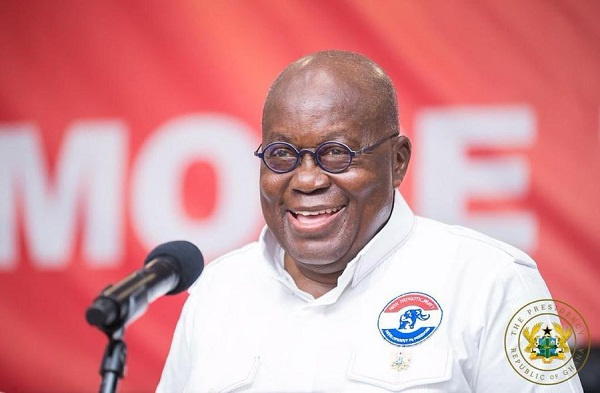President Nana Addo Dankwa Akufo-Addo has indicated that the Cedi’s appreciation against the US Dollar is as a result of the measures taken by his government in partnership with the central bank, the Bank of Ghana (BoG).

Mr Akufo-Addo said the appreciation did not happen by chance.
Speaking at the centenary celebration of the Ga presbytery of the Presbyterian Church of Ghana in Accra on Sunday December 18, he said “At the height of our challenges there were some who doubted the capabilities of my government and I to return our nation back onto the path of progress and and prosperity and lift us out of our current problems. In those dark moments, my fellow Ghanaians and and congregation, I could only recount the words of the St Matthew chapter 19 vrs 26 which states ‘But Jesus looked at them and said to them, with men this is impossible but with God all things are possible.”
He added “With the appropriate policy, determination and hard work on our part things are beginning to turn around. What seemed impossible yesterday is now becoming possible. We are definitely not yet out of the woods. However, today, the Cedi is rapidly appreciating against the US Dollar and all major currencies, making up for its losses and the prices of petroleum products are reducing at the pump.
“The strengthening of the Cedi has not happened by chance but through the implementation of deliberate policies by government in collaboration with the Bank of Ghana. These include Cedi liquidity tightening measures resulting in the offloading of forex as stalled value by speculators, the improvement of forex inflows from remittances and the mining sector and the reaching of the staff level agreement with the IMF for a 3 billion US Dollar package. All these have combined to bring the Cedi to this position and I can assure you that government will continue to work hard to maintain and sustain the gains made.
“Indeed, in the weeks ahead, the BoG will continue with the purchases of forex from the mining and oil sectors to enhance liquidity supply to the markets, continue with single unified forex forward auction and some modest targeted bilateral support to critical import.”
Earlier, the Director of Financial Markets at the Bank of Ghana (BoG), Stephen Opata, also stated that the tightened Monetary Policy by the central bank is what has resulted in the good performance of the Cedi against the Dollar.
He explained that the local currency is performing well on the back of increase in the policy rate to 27 percent.
“We have also seen that Monetary Policy has been tightened, coming on the back of recent increases in the policy rate to 27 percent. This has also contributed to the cedi’s good run”, he said.
He added that “the continuous hike in the policy rate will also ensure that excess cedis can be used to purchase government bonds and other securities, despite current concerns with the proposed debt exchange programme”.
The Director of Research at the Institute of Economic Affairs (IEA) Dr John Kwakye also said the Cedi’s improved performance against the Dollar is largely due to reduction in speculations in the financial market.
The Cedi has over the past few days, especially since the start of December 2022, been gaining strength against the major trading currencies particularly, the Dollar.
Per the Bank of Ghana (BoG) rate, the Cedi, as of Thursday December 15, was buying at GHS7.9975 to a Dollar and and selling at GHS8.0056 to a Dollar.
Dr Kwakye asked the government to act immediately to consolidate the gains made.
In a tweet, he said “Unless the cedi is backed by improved economic fundamentals, its stability will not last. The current stability is riding only on the back of reduced speculation.”
He added “The cedi appreciation is a correction to largely speculation-fueled depreciation. However, the extreme volatility in the exchange rate is not good for the economy.”
“The question is how long will the cedi stability last? We have been here before. The way to ensure lasting cedi stability is to address the economy’s structural weaknesses while building strong financial buffers,” Dr Kwakye further stated.

